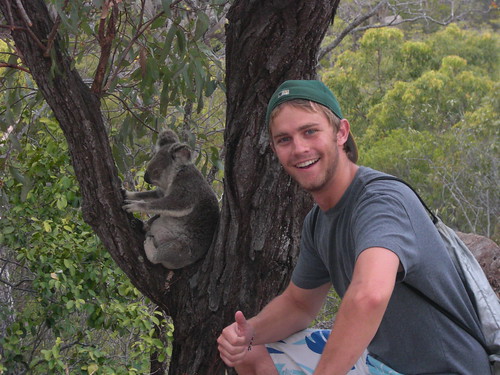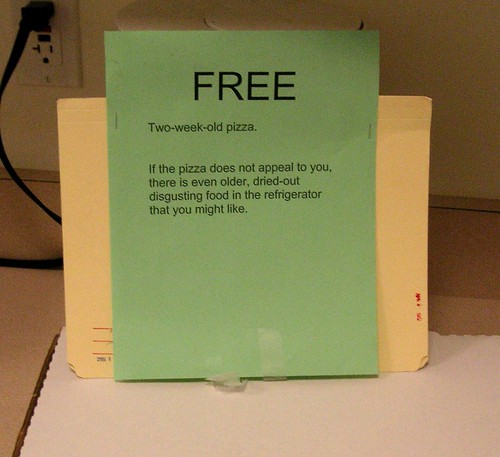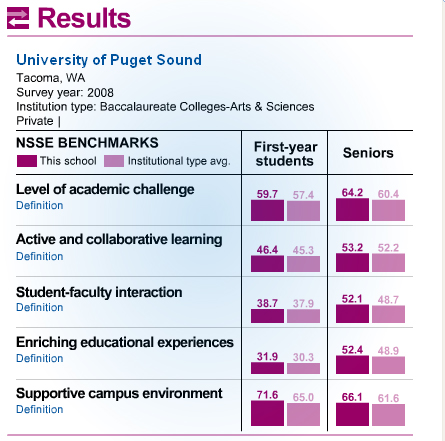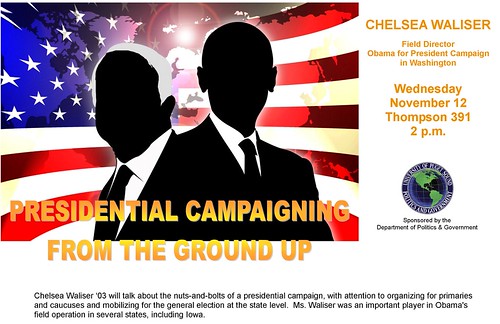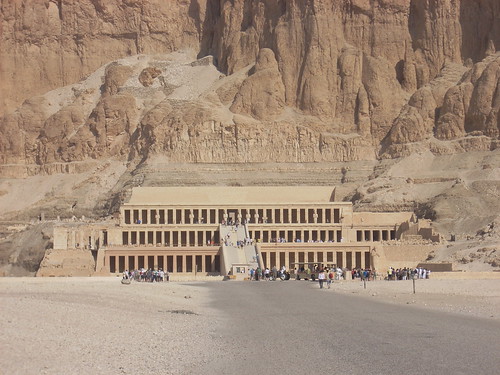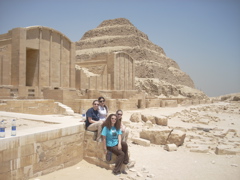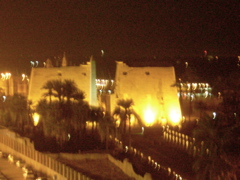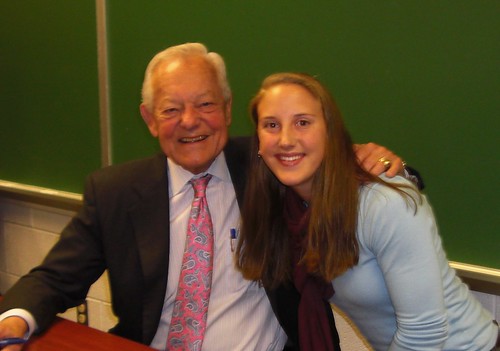Tuesday, December 16, 2008
Happy Holidays!
Work for Professor Weinberger
PDX monthly mag on UPS and PG
...“The small classes allow your relationship with the professor to grow,” says Sam Kussin-Shoptaw, a senior politics and government major whose largest class in four years had 31 students. Those relationships can have big payoffs. In 2006, one of Kussin-Shoptaw’s professors, who’d noticed his interest in politics, told him about an opportunity to work on Democrat Darcy Burner’s US Congressional campaign. The then-sophomore parlayed his volunteer position into a more permanent role with the Democratic Party, and this summer he attended the Democratic National Convention in Denver.
Kussin-Shoptaw also commends faculty members for their willingness to take time from their own research projects to help students. “Even outside of office hours, they’ll spend time with me,” he says. “I mean, they do what all professors do—they do their research and write their books—but mostly they’re here to teach first. They make us their No. 1 priority.” Which, after all, is how a university should be.
Wednesday, December 10, 2008
Dissertations should be dancable
Ever asked an academic about their research only to be subjected to 20 minutes of nonsensical droning? Thanks to YouTube, it just got a whole lot easier to explain a complicated thesis at a cocktail party. In early October, Ph.D. students worldwide were challenged by Gonzo Labs/AAAS to re-create their dissertations through interpretive dance and post the videos on YouTube. Dozens of performances were submitted, ranging from tangos to Lindy Hops to night-vision hula-hooping. The choreography was scored on its ability to bridge the gap between art and science, though you should feel free to judge based on levels of jubilation and pure absurdity.
Read and see more here.
Graduating? Paid internship in DC...
I’ve included some information below that you can easily forward on to any student who may be interested in working for a think tank or policy organization. Many students use winter break to begin planning for their future, so please get this information to them – it may be the exact opportunity they are looking for.
Happy holidays!
Stephen Sweet
Program Coordinator, Marketing and Recruiting
Charles G. Koch Charitable Foundation
http://www.cgkfoundation.org
Ph: 202.737.7945
The Koch Associate Program: A Unique Job Opportunity
The Koch Associate Program is a very selective, one year, paid career opportunity for bright, talented young people who are interested in pursuing a career in the non-profit sector. Graduating students often don’t realize the great job opportunities that market-oriented non-profit organizations provide for those interested in advancing the ideas of a free society. The Associate Program is a great way to jumpstart that career, because we help Associates develop the knowledge, skills, and experience necessary for a successful future with free-market think tanks, policy institutes, or other non-profit organizations.
While in the program, Associates are placed into a full-time role with a reputable organization where they work four days each week. The positions available to Associates cover various fields such as policy analysis, donor relations, program management, legal reform, public relations, and marketing. A full list of the organizations where Associates work along with some examples of project placements can be found on our website. Then, one day each week, Associates come together in a classroom setting at the Foundation to engage in reading discussions and group projects, network with their peers, listen to guest speakers, and learn how to apply Market-Based Management® in a non-profit setting through interactive exercises and workshops.
Associates range in experience from recent graduates to those with up to ten years of work experience, and they come from diverse fields and academic majors. Project assignments are determined on a rolling basis, so the earlier candidates apply, the sooner they can select their non-profit placement. All applications must be submitted via our website.
To learn more about the program and the Foundation, please visit http://www.cgkfoundation.org.
Monday, December 08, 2008
Legislative Reporting Internship--PAID, 12/15 deadline!
We are working to broaden the base of applicants, and I have attached a description/application. Please take a look and consider recommending it to your top students. It is an invaluable opportunity for a student interested in the legislative process, open government, and communications.
The challenge for students is the schedule, which ideally includes being in Olympia for three days a week during the legislative session. Previous winners have been PLU students, but it is open to upper level students at any college in Washington.
If you have a strong candidate, please have him or her send an e-mail to me confirming their interest in applying. They can send the requested materials by Dec. 15. We expect to offer this opportunity again in 2011, so keep that in mind as well.
WNPA Foundation announces
ZUBROD LEGISLATIVE REPORTING INTERNSHIP
Washington State Legislative Session Dates: Jan. 12 – April 26, 2009
Applications due Dec. 15, 2008 The WNPA Foundation invites Washington state colleges and universities to nominate third- or fourth-year students for the Zubrod Legislative Reporting Internship. In addition to journalism students, the internship is open to students majoring in communications, law or political science. The recipient will receive a stipend of up to $1,000.
To nominate a student, professors are asked to write a letter of nomination and provide the student with a copy of this announcement as guidance to the application process. By Dec. 15 the student must send the following to the WNPA Foundation: a letter of interest, a resume, the professor’s letter of nomination and a letter of recommendation from one other faculty member. Applications may be mailed to the address above or faxed to (206) 634-3842.
Requirements for the Zubrod Legislative Reporting Internship
This internship requires a high level of self motivation and strong interest in learning about legislative issues of concern to newspapers in Washington state. Applicants should expect to spend up to three days a week in Olympia during the legislative session, and should have a basic understanding of the legislative process prior to the start of the session.
The intern will work with Rowland Thompson, Executive Director of Allied Daily Newspapers of Washington, on bills of interest to members of Washington Newspaper Publishers Association and Allied Daily Newspapers. Activities may include researching information through the bill room or caucuses, attending committee hearings, interviewing sponsors of pertinent legislation, and possibly writing stories on bills and their history. The student will also write a blog on what they observe about how the media is faring in Olympia. Intern selection will be announced in December.
The internship was established in 2005 in honor of Jerry Zubrod, who died in 2001. After 23 years of service, he retired as executive director of WNPA in 1988.
If you have questions about the application process or the internship, please contact Mae Waldron at (206)634-3838.
Friday, December 05, 2008
Holiday Function Today at 5
Writing Excellence Awards: Deadline 1/29
Writing Excellence Awards
To encourage and reward good writing in all disciplines, the Writing Excellence prizes will be awarded again this year.
A total of nine prizes ($250.00 each) will be awarded:
Two prizes in each category: Humanities, Social Sciences, and Natural Sciences and Mathematics; one prize each for Freshman Seminars, Connections, and Graduate Programs
Rules for the Contest
Papers written as part of the requirement for courses taken at the University of Puget Sound during the most recent Spring, Summer, or Fall 2008 are eligible. Papers of any length may be submitted; short papers are as likely to win as long ones.
Students may submit no more than one paper in each category, and each paper must be accompanied by a description of the assignment and an entry form. (Entry forms are also available at http://www.ups.edu/writingexcellenceawards.xml) Students should submit the original paper in person with the professor’s comments, or a photocopy of it, to the Center for Writing, Learning, and Teaching by 5 p.m. on Thursday, January 29, 2009.
Questions
If you have any questions about the process or the prizes, please call Julie Neff-Lippman (253.879.2696) or send an e-mail (neff@ups.edu).
Thursday, December 04, 2008
Global Youth Connect: Rwanda and Bosnia
Greetings from Global Youth Connect!
We are writing to ask for your assistance in sharing information regarding our summer 2009 international human rights training programs with young leaders (ages 18-30) in your network who may be interested in participating in one of our upcoming human rights delegations to Bosnia or Rwanda. Brief information on each program can be found below and more detailed application information is available on our website at: www.globalyouthconnect.org/participate. The deadline to receive applications is January 30, 2009.
Global Youth Connect is an international human rights organization which is building and supporting a community of youth who are actively promoting and protecting human rights, and educating and inspiring the next generation to work for peaceful change. We have been organizing international human rights delegations since 2001. Please visit our website to learn more about our work: www.globalyouthconnect.org.
We greatly appreciate your help in making sure we get the word out to talented and motivated young leaders who might be interested in this unique international opportunity for learning, service and connection for human rights, conflict resolution and peacebuilding.
Best wishes,
Kendra Penry
Interim Executive Director
Global Youth Connect
www.globalyouthconnect.org
Acting together for compassion, human rights and responsibility
Human Rights Delegations for Young Leaders -- Summer 2009
Program Locations: Bosnia & Rwanda
Application Deadline: January 30, 2009
Global Youth Connect, an international human rights organization, is pleased to announce that we are accepting applications from young leaders (ages 18-30) for our Summer 2009 international human rights delegations. Program locations will be Bosnia and Rwanda.
Human rights delegations are a unique, first-hand opportunity to cross cultural boundaries and learn about the daily reality of human rights as experienced in a complex and increasingly globalized world. Each delegation weaves together three core sets of activities: site visits to local organizations, hands-on fieldwork projects, and a human rights training workshop with local youth activists.
Bosnia (June 30 - July 17, 2009)
Program Tuition: $2,750
This delegation will explore the roots of the conflict and the dynamics of justice, reconciliation and peacebuilding as experienced in Bosnia. Participants will gain experience in conflict resolution and transformation and deepen their understanding of the post-conflict challenges faced by Bosnians today, especially youth. Participants will have an opportunity to meet with Bosnian NGOs working on issues of human rights, community development, youth empowerment, and conflict resolution. The program will also include a workshop with Bosnian youth and the opportunity to work hands-on with local organizations to assist them in their daily activities.
Rwanda (June 27 - July 19, 2009)
Program Tuition: $2,250
This delegation will explore the roots of the 1994 Rwandan genocide, how this legacy of violence has impacted the country and its people, particularly Rwandan youth, and also how the country is attempting to rebuild today. We will examine issues of truth, justice and reconciliation in the context of post-conflict Rwanda and what is needed to strengthen local institutions and programs dedicated to promoting a culture of respect for human rights. Participants will connect with young Rwandans and get involved in a variety of collaborative projects aimed at promoting human rights as well as meet with leading human rights defenders, government representatives, international institutions, youth and others from local communities to learn more about the political, economic and social challenges faced by Rwandans today.
Application Deadline: January 30, 2009
How to Apply: We invite interested young leaders to apply. We are looking for participants who are between the ages of 18-30 and who possess U.S. citizenship or residency as well as international students studying full-time at a U.S. college or university. Most importantly, applicants should wish to expand their knowledge and understanding of human rights and social justice. Participants will become part of a growing global movement of youth acting together for compassion, human rights and responsibility.
For detailed information on program activities, costs, fundraising/financial aid, and application information, please visit our website: www.globalyouthconnect.org/participate, or contact me directly at kendra@globalyouthconnect.org.
Best wishes,
Kendra Penry
Interim Executive Director
Global Youth Connect
www.globalyouthconnect.org
Acting together for compassion, human rights and responsibility
IPE hosts Foreign Service Alum on 12/9 (DATE CHANGE)
Are you interested in a potential career in the U.S. State Department's Foreign Service. If so, be in the Diversions Cafe at Noon on December 9 to have coffee with Amanda Jacobsen. (Note change of date).
Mandy Jacobsen (IPE Class of 1999) recently finished her first Foreign Service tour of duty in Togo. She and her husband Cort Weber (also IPE 1999) are now headed to Nepal after some months of training in Washington DC.
Mandy and Cort are happy to talk with any interested students about Foreign Service opportunities during their brief visit to Tacoma.
Wednesday, December 03, 2008
Summer law program for undergraduates
The 18th Summer for Undergraduates Program is scheduled for May 18-June 12, 2009.
Overview
The Summer for Undergraduates Program at Florida State Law is the largest of its kind and has become a model for other law schools nationally. Sixty undergraduate college students will be chosen from the applicant pool to participate in the four-week long program. During those four weeks, we focus on three main components:
* Classroom Experience — Daily classes are taught by law school professors and writing instructors. Lectures simulate first-year law classes and familiarize students with the functions of the American legal system. Writing workshops help students to develop their writing and communication skills.
* Law School Admissions Process — Students are given the opportunity to talk to the admissions staff and committee regarding the important aspects of the law school application process. This includes practical workshops on completing the application, writing personal statements, LSAT exam preparation, writing resume and cover letters, financing law school and individualized career planning.
* Careers in the Law — While the program is academic in nature, there are a number of exciting and enjoyable activities that take place outside of the classroom, such as: visits to the Florida Supreme Court and local law firms, moot court oral arguments, and visits from prominent attorneys in a variety of practice areas.
Eligibility
College students enrolled at two-and four-year institutions, in all majors and from all backgrounds, are invited to apply following their freshman year. We particularly welcome students from groups historically underrepresented in the legal profession. Because one purpose of the program is to help students direct their remaining time in college to best prepare for law school, freshmen, sophomores and juniors are given preference in the admissions process. Students who will have earned their degree prior to the start of the program will not be eligible for admission.
Program Costs
There is no tuition or room and board charge for this program. Florida State Law provides room and board in residence-hall accommodations, course materials and a $500 stipend to all participants. Students are responsible for their travel expenses to and from Tallahassee.
How to Apply
Applications are accepted after October 1, 2008 and must be postmarked by Friday, March 27, 2009. In order to apply, students must complete and sign the two-page application for admission. Applicants are also required to submit a resume, two letters of recommendation, a personal statement and a current official transcript. Each application is carefully reviewed in its entirety by the program's admissions committee.
For more information about the 2009 Summer for Undergraduates Program, please contact:
Florida State Law
Office of Student Affairs
425 West Jefferson Street, Room 206
Tallahassee, FL 32306-1601
850.644.7338; Fax: 850.644.4358
E-mail: saffairs@law.fsu.edu
What if we held college and no one showed up?

The rising cost of college — even before the recession — threatens to put higher education out of reach for most Americans, according to the biennial report from the National Center for Public Policy and Higher Education.
Over all, the report found, published college tuition and fees increased 439 percent from 1982 to 2007, adjusted for inflation, while median family income rose 147 percent. Student borrowing has more than doubled in the last decade, and students from lower-income families, on average, get smaller grants from the colleges they attend than students from more affluent families.
“If we go on this way for another 25 years, we won’t have an affordable system of higher education,” said Patrick M. Callan, president of the center, a nonpartisan organization that promotes access to higher education.
“When we come out of the recession,” Mr. Callan added, “we’re really going to be in jeopardy, because the educational gap between our work force and the rest of the world will make it very hard to be competitive. Already, we’re one of the few countries where 25- to 34-year-olds are less educated than older workers.”
Read the whole thing here.; on study behind the article here.
Tuesday, December 02, 2008
Japan-America and Korea-American Student Conferences
Korea America Student Conference
The second annual Korea-America Student Conference (KASC) is set to begin this coming July 2009. We will be kicking off our opening ceremonies in Seoul and continuing on through three other regional sites in Korea.
Building on our successful Conference this summer, we are expanding our program to include a total of 50 students from both Korea and the United States. These students will have the opportunity to discuss their own research on bilateral and international issues, attend academic and business lectures by leaders in the field, and engage in intensive cross-cultural discussions while traveling and living as one group. Rotating yearly between host countries, this year's events will be held in the Republic of Korea.
University students of all schools and levels of education (Undergraduate and Graduate alike) will convene to discuss the most current issues, ranging from the environment to science and beyond. Not only do conference participants learn about one of the world’s strategic bilateral alliances, they also have the opportunity to directly help reinforce the bonds between countries by sharing knowledge and experiences while making memories and friendship with other future leaders.
Japan America Student Conference
Each summer, nearly 80 students from universities across Japan and the United States convene to discuss some of the hottest topics facing the two nations. The program alternates host countries each year giving students the rare opportunity to see places, whether at home or abroad, and learn about their culture through the eyes of others.
From politics to pop culture and everything in between, JASC offers motivated university students of all levels an outlet for ambition, intellect, and cultural stimulation.
Not only do conference participants learn about one of the world’s most strategic bilateral alliances, they also have the opportunity to directly help reinforce the bonds between countries by sharing knowledge and experiences while making memories and friendships with other future leaders.
$15 an hour this summer--paid internships at the Port of Tacoma
This is a really good opportunity that can mix politics, business, and international relations. The Port has a Government Relations office that might also be open to interns, and PG has a contact there if you want to explore that opportunity more directly.
The Port of Tacoma internship opportunities are designed to offer students an opportunity to participate in meaningful work experience to compliment and enhance their learning and growth within their programs of study. These work experiences are a chance for students to apply their classroom learning in a real work setting. More importantly, interns gain access to knowledge and expertise of the talented people that we have at the Port, which we feel will be beneficial to their career development.
In return, the Port benefits by having capable and enthusiastic students assist in normal work activities and/or special projects and events, while making a valuable contribution to the next generation of an up and coming creative, energized and educated workforce.
The types and the number of internship opportunities vary year to year. Opportunities can range in all types of departments such as IT, Finance, the Port’s Lines of Businesses, Human Resources, Communications, Marketing, Operations, Engineering, Environmental, Maintenance, etc. Most of the internships are full-time during the summer months, but occasionally there may be opportunities during the academic year on a part-time basis. All of our internships are paid with an hourly rate as follows:
College $15.00/hr
Graduate $18.00/hr
To be eligible to participate in the Port’s internship program, candidates must be enrolled in an accredited school, college or university. Students will be considered for internships based on qualifications and course of study for each opportunity.
Recruitment for internship opportunities generally begins in January and February for internship opportunities for the following summer, however, internships may arise anytime throughout the year. Listings may be sent to major universities and local community colleges and associations. Students can also contact the Port’s Human Resources Office to find out what opportunities may be available or should send a cover letter and resume to hr@portoftacoma.com for consideration of open opportunities. Please direct any questions pertaining to internships to Christina Kim, Manager, Employment services, at 253.592.6757 or send an e-mail to the above e-mail address.
Monday, December 01, 2008
Garrett Heilman '09 summer research talk on Iran
Professor Kessel talk on Thursday (correction)
The Political Science Association presents:
“Questioning,
Authority,
and
Questioning Authority”
How can AUTHORITY be compatible with DEMOCRACY?
a lecture by:
Professor Alisa Kessel
Politics and Government
Thursday December 4th at 6pm
Wyatt 101
Tuesday, November 25, 2008
Remembering Doug Edwards
Monday, November 24, 2008
Back the Axe
Okay, so it's a hatchet, but allow a little creative license. In commemoration of the return of the hatchet, we've got a new design for Politics and Government for 2009, and in a hoodie, no less:
We'll be taking orders on campus next semester and if you're off campus, we already have them in our Cafe Press shop for only $25 bucks. What a deal.
Friday, November 21, 2008
Video Excerpt: Chelsea Waliser talk
You'll forgive the initially shaky video, as I was using a camera without a tripod. Click on the video (not the play button)if you want to watch it in higher quality; there is an option in YouTube on the bottom right of the screen on their site.
Thursday, November 20, 2008
Wednesday, November 19, 2008
US Canada Student Conference
Student Crossing Border Conference & Debate
5-6 March 2009
Seattle, Washington
Canada and the United States share one of the world's longest borders and are each others largest trading partners. Canada is America's largest supplier of crude oil, natural gas and electricity. The U.S. and Canada are allies in the War on Terror and partners in NORAD for decades. However, as in most relationships, challenges and differences do exist.
EVENT / DATES
The Consulate General of Canada Seattle, in collaboration with the Pacific Northwest Canadian Studies Consortium, is organizing a two-day Student Conference to focus on the US-Canada border and issues of importance in the bi-lateral relationship.
After arrival in Seattle on Thursday 5 March, the students will travel to the US-Canada border Port of Entry at Blaine WA / Surrey BC for presentations and tours organized by the Canada Border Services Agency and US Customs and Border Protection. Students will learn about the operations of both agencies and how they partner to secure the border against threats while expediting travel for legitimate trade and commerce. The day will conclude with a Welcome Dinner in Bellingham, Washington and return to Seattle.
On Friday 6 March the Conference will entail 4 panel presentations. Each panel will focus on an issue of importance to Canada and the United States and last 90 minutes. Each panel will have two teams. Each team will be composed of one American and one Canadian student. Each team will be tasked with researching, presenting and explaining the issue assigned (the American student will present the American position and the Canadian student will present the Canadian position). Each team will suggest a resolution / solution. A moderator and members of the audience will be invited to ask questions and / or challenge the presentations and resolutions of two teams. A team of judges will select the team deemed to have made the best presentation and proffering the most convincing resolution / solution. The day will conclude with an Awards Dinner.
STUDENT ELIGIBILITY / SELECTION
A total of 16 students will be selected. Eight American and eight Canadian. Students must be full-time undergraduates attending a university in Washington, Idaho, Oregon, Alaska, British Columbia or Alberta that is a member of the Pacific Northwest Canadian Studies Consortium. No more than two students will be selected from any one university.
Interested students must complete the attached application and mail / fax no later than
15 December 2008. Successful applicants will be notified by 15 January 2009. Students will be paired (one American and one Canadian for each of the 8 teams) and assigned their issue by 1 February. Students are invited to work with their faculty advisors to see if this may qualify as an independent study to earn course credit.
Tuesday, November 18, 2008
President Thomas talks about our economic situation
All of us are living through a period in which we have witnessed dramatic and unprecedented economic events throughout the nation and around the world. These developments have affected—and will affect—our personal lives both directly and indirectly. We have also been hearing and reading daily reports of colleges and universities facing difficult financial decisions as a result of those circumstances. I write to you today to assure you that, although University of Puget Sound is by no means immune to the financial challenges we have seen and will see ahead, we are navigating these challenging times from a position of strength.
We are fortunate that Puget Sound has a long tradition of careful planning, strong operating performance, and balanced budgets. It is an advantage to enter a tough economic environment like this one with such a record, along with a clear commitment to a shared mission. As always, and with increased intensity, we will continue to make thoughtful decisions about our endowment, debt portfolio, operating expenses, fundraising, financial aid, tuition prices, and budget planning. Unlike many institutions, we have no plans to initiate mid-year changes to our budget—including, and especially, to tuition and financial aid. We plan to stand by our commitments to students and families, and to our entire community.
Puget Sound has strong liquidity to cover operating expenses, and has had uninterrupted access to cash throughout the economic crisis. Puget Sound’s operating cash is largely invested in an AAA-rated money market fund, currently benefiting from the U.S. Treasury’s Temporary Guarantee Program. Due to falling short-term interest rates on high quality investments, earnings on that cash have declined dramatically, however, diminishing one important source of revenue within our operating budget. Should credit be needed, Puget Sound maintains strong long-term credit ratings of A1 and A+ from Moody’s Investors Services and Standard & Poor’s, respectively.
Also in recent months, Puget Sound’s endowment market value has declined because a portion of our portfolio is exposed to public stock markets that have declined significantly. Declines have been less than the U.S. and international stock market indices because the endowment has been broadly diversified and invested with the long-term in mind, including anticipation of bear markets. Endowment distributions are calculated using a 36-month average to smooth budget impacts from volatile markets. Smoothing distributions is important because annual endowment distributions support student financial aid, academic programs, and general operations. Endowment distributions were up 10.4 percent in 2007-08. We know that future distributions will be negatively impacted in the next few years, although we can’t yet know the precise degree.
Looking ahead to next year, Puget Sound’s Budget Task Force has convened several times this fall and is in the midst of preparing a recommendation to me for the 2009-10 budget. This budget will be finalized, after review by the board of trustees, in late February 2009. As is our custom, this information will be shared broadly as soon as it is available.
We are making a special effort to enroll a qualified and diverse freshman class for next year and to retain our current students as well. Anticipating a high demand on financial aid in these challenging times, we remain committed to supporting families and students financially as they make an investment in a Puget Sound education. To ease the pressure on tuition increases, we will also continue our vigorous fundraising efforts, which have seen great success in recent years and will be of increasing importance as we see other revenue streams attenuated.
We will no doubt have difficult decisions to make as we plan for the future. I will ask the entire community to be thoughtful in assessing needs and priorities, and creative in designing solutions. Puget Sound has long been a place that has successfully accomplished more with less, efficiently and effectively deploying resources where they are needed most. Our budget managers are conscientious, innovative and resourceful, with student success and the university’s long-term health always in mind. Working together, we will continue to serve our mission effectively, achieve our strategic goals, and ensure our financial health.
It is important to note that these times underscore the value of our efforts even as they bring into sharp relief the challenges before us. This year we celebrate Puget Sound’s 120th anniversary, and over the course of more than a century we have always emerged out of challenging times stronger and with more clarity about our purpose and mission.
Now is a time to think strategically and for the long term, to act with confidence as we address unprecedented economic conditions. It is a time to keep first things first. Our purpose is to prepare students for the highest tests of democratic citizenship in an often uncertain world. That mission, as the distinctive and distinguished national liberal arts college Puget Sound has become, has never been more clear, and at no time in our history has it been more urgent or the need for it more great.
Sincerely,
- Ron
~ ~ ~ ~ ~ ~ ~ ~ ~ ~ ~ ~ ~ ~ ~ ~ ~ ~ ~
Ronald R. Thomas, President
University of Puget Sound
1500 N. Warner St. #1094
Tacoma, WA 98416-1094
Tel: 253-879-3202
Fax: 253-879-3938
Monday, November 17, 2008
Friday, November 14, 2008
Student conference on human rights
--
Shalyn Hockey, Sarah Malin, Hallie Ryan
Directors
Northwestern University Conference on Human Rights
conferenceonhumanrights@u.
Professor Share's band: a review
BLUEGRASS FROM COFFEETOWN
By Doug Bright
All too often, especially in this age of relentless musical homogenization, urban bluegrass bands tend to be painfully easy to identify. Despite their polished vocal harmonies and slick instrumental chops, the twangy, heartfelt simplicity that defined the music in the early 1950's is virtually absent. Nevertheless, one all-star bluegrass band from Latt`e Land stands in refreshingly sharp contrast, demonstrating a high standard of musicianship without losing the music's deep-rooted hillbilly soul. In witty recognition of this fact, the band calls itself The Downtown Mountain Boys.
The seeds were planted about 1999 when fiddler Paul Elliott joined a Seattle bluegrass band called Rainy Pass and met singer/guitarist Don Share. A classically trained violinist from childhood, Elliott got his first taste of bluegrass at age 14 when a friend loaned him two historic albums: Flatt and Scruggs' 1962 Carnegie Hall concert and The Nitty Gritty Dirt Band's 1972 all-star country session, WILL THE CIRCLE BE UNBROKEN. "The one-two punch of those was really somethin'!" he recalls. "I thought, You mean you can do that with a violin? Why didn't anybody tell me?"
After studying country fiddle with the now-famous Barbara Lamb, whose father had been his elementary-school music teacher, Elliott joined his first local bluegrass group, The Apple Blossom String Band, about the time of his senior year in high school. During the late 1970's he gained valuable experience touring the Northwest with an eclectically styled trio called The Cats 'n' The Fiddle. "We'd do everything from R&B to traditional fiddle tunes to wacked-out arrangements of old jazz tunes," he recalls. "I learned a lot about arranging and different repertoires. That was a great band!"
After subbing occasionally in California for fiddler Paul Shelasky in the progressive bluegrass band Good Ol' Persons, Elliott spent four more years during the mid-to-late 1980's in a Spokane-based country-rock band. "I don't think that band ever played in Seattle," he says, "but it played Montana, Idaho, Wyoming, and Oregon. That was another pretty hard-workin' band. It's not a very healthy lifestyle. I decided I was gonna go back to the University, which I had dropped out of to go play with The Cats 'n' The Fiddle, and I was gonna do something practical."
Although his early coursework at the University of Washington focused on the hard sciences, Elliott ended up with a degree in music composition. "After I graduated," he recalls, "I went off to London for six months to study composition with a guy over there. I traveled around, came back, and wound up working for Microsoft--a complete left turn. I came out there as a summer job while I was goin' to school at the U. I didn't have any background in it, but I sort of had a knack: I really enjoyed that kind of problem-solving, and I wound up bein' out there for nine years."
It was at the Puget Sound Guitar Workshop around 1999 that Paul Elliott reconnected with bluegrass music. "I sat down in a bluegrass jam session and just totally got my butt kicked," he confides. "It suddenly dawned on me that I really never did know how to play bluegrass, so I went home and looked around to see who was playing bluegrass, and I met Rainy Pass. They were lookin' for a fiddle player, so I started playin' with those guys, and that was really the first time I seriously started investigating bluegrass fiddle as a style and tryin' to work on it. When I started playin' with Rainy Pass, I really got interested in what makes bluegrass bluegrass."
"Rainy Pass really got together around the original songwriting of Nancy Riccio," explains Don Share, who was playing Dobro steel guitar in the group. "She is a really good songwriter. That band was very much her band." About two years after the 2001 release of a critically acclaimed CD called COLD RAINS OF WINTER, Rainy Pass dissolved when Riccio moved to Arizona. It was then that Paul Elliott and Don Share began discussing the formation of a new band. The veteran players under greatest consideration were banjoist Dave Keenan and mandolinist Tom Moran. Keenan, an eclectically styled multi-instrumentalist, had gained his fame in two bands with singer/guitarist Jo Miller: Ranch Romance in the early Nineties and the rockabilly-oriented
Burly Roughnecks a decade later. Moran had played everything from bluegrass to European classical music around town since the 1970's and had, in fact, participated in the progressive jazz string band Cat Walk with Elliott in the early Nineties. "When Rainy Pass broke up," Elliott explains, "I think Don and I were thinking, "Well, gee, what would it be like to be in a band with Tom? What would it be like to be in a band with Dave?" So we asked everybody, and everybody said yes."
The Downtown Mountain Boys' first bassist was Joe Wilmhoff, who had done the digital mastering for the Rainy Pass album. When Wilmhoff returned to college two years later to pursue a career in nursing, he was replaced by Terry Enyeart, a Longview native who had made his first mark on the Seattle bluegrass scene in the popular band Rural Delivery. "When I joined RD," he explains, "I started playin' rhythm guitar and mandolin, so my bass fell to the wayside. We still play: we usually get four gigs a summer."
Of the Downtown Mountain Boys, Enyeart says, "I really enjoy playin' with those guys. It's a great place for me to keep my bass licks up. I play guitar and vocals with the Cascade Mountain Boys, so I guess I'm spreadin' myself a little thin right now, but none of the bands are playing so much that they bump into each other." Despite Enyeart's busy musical life, the Downtown Mountain Boys couldn't be happier. "I've always been a big fan of Terry's," says Dave Keenan.
"Having Terry in the band is great," Paul Elliott concurs. "Terry has always been one of my favorite singers around this area."
In 2006 the Downtown Mountain Boys began crafting their debut CD, working in the do-it-yourself tradition of mountain homebrewing. "Paul recorded it," Dave Keenan explains. "About two years ago Paul decided he wanted to build a studio in his house. He's one of those guys that gets an idea and just goes full boar, so he researched it all, bought a bunch of great mikes, got ProTools, and learned how to do it. It's pretty simple--just two rooms, really, although there's kind of a hallway that's somehow used as well."
Elliott's inspiration had come from working with David Lange, the most popular and respected engineer in the Seattle area folk community. In fact, it was at Lange's studio and under his tutelage that Elliott produced a debut CD for another local bluegrass band, Back Burner. "I had worked a lot in Dave's studio as a musician on other people's projects," he explains. "I hold him in
incredibly high regard as an engineer, especially for acoustic music. He just knows how to get good sound, so it was really cool to have an opportunity to go through the whole process in the studio with Dave as I was working with Back Burner and observe everything he did."
Concerning his own home-based facility, Elliott says, "Studio is maybe a flattering description of it. We don't really have enough room here to record everyone at the same time." Consequently, given the conflicting schedules of the musicians, the size of Elliott's studio, and the impossibility of their fiddler functioning simultaneously as engineer, the Downtown Mountain Boys were forced into a cut-and-paste approach to recording that can be very difficult in a medium as
spontaneous and interactive as bluegrass music. "We just went in, one at a time, and just slowly built this record from the ground up," Dave Keenan remembers. "We did a lot of rhythm guitar first and slowly added little pieces at a time, which is the way that I like to record. I can't explain why, but it worked."
In all too many cases, the cut-and-paste approach results in a performance that's all precision and no soul, but this disc fairly crackles with energy from beginning to end. BIG DARLIN', named for a Paul Elliott instrumental that serves as the final track, offers a satisfying mix of the old and the new delivered with a brand of creativity that's deeply rooted in tradition.
It opens with Nancy Riccio's "Back In The Black", a fast-paced attention-grabber that captures the desperation of living from paycheck to paycheck in tough economic times. Another uptempo Riccio number on this album involves desperation of a different kind, but in this drama the name of the lady being desperately sought is Carol Ann, not Susan. Both are characterized by solid three-part harmony and crisp, snappily choreographed solos from banjoist Dave Keenan, mandolinist Tom Moran, and fiddler Paul Elliott. From the Gibson Brothers, a popular bluegrass band from upstate New York, comes "I Gotta Get Back To You", which features guitarist Don Share in a tight vocal duet with Keenan. The twin fiddle-mandolin work from Elliott and Moran,
sometimes in unison and sometimes harmonized, adds a fascinating dimension. Historically speaking, the oldest number on this album is the traditional "Black-eyed Susie", but here again, the Downtown Mountain Boys put their creativity to use. Instead of the barn-burning tempo at which it's generally performed, their pace is a relaxed lope, with Terry Enyeart leading on the
verses and Moran harmonizing beautifully with Elliott's fiddle. Likewise, Johnny Cash's "Train of Love" is taken at a slower-than-usual tempo, but the band's insistently rhythmic, Cajunesque approach still captures the song's essential train effect.
As this album eloquently demonstrates, the most astonishing thing about the Downtown Mountain Boys is the deeply rooted traditionalism of their original material. Terry Enyeart's "My Holy Beacon" is the quintessential bluegrass gospel song, sounding as if it could just as easily have been written during the music's'formative years. Dave Keenan's "Bug Tussle" has the bluesy, down-home feel of an old-time fiddle-and-banjo tune, but its brisk tempo and heads-up instrumental work would render it exciting in any age. Though somewhat crookedly metered and quirkily chorded, Paul Elliott's "Big Darlin'" possesses a similarly bluesy old-time quality, and the band comes up with fascinating instrumental duet passages that climax with yet another dazzling demonstration of fiddle-mandolin harmony from Elliott and Moran.
Whether they're performing a Flatt and Scruggs classic like "Till The End of The World Rolls Round", a swinging vintage honky-tonker like "Smooth Sailin", or a hot new original, the Downtown Mountain Boys are a true-blue bluegrass band. Their snappy, tradition-based instrumental work is fully matched by solid, country-flavored vocals from Terry Enyeart, Don Share, and Dave Keenan. "Basically, we've got three baritones," Paul Elliott confides. "We don't really have a tenor singer, so every time we're workin' up a song, there's a lot of experimentation to find out how we can stack stuff and what key to look for. It's a limitation, but I guess it defines."
With the exception of bluegrass festivals and local performances, the Downtown Mountain Boys are relying on the popular online music store Cdbaby.com to sell their album, and they're delighted with the results. "I can't think of a bad thing to say about 'em," Paul Elliott says of the Portland-based company. "Heck, it's brought us sales from Spain and Brussels and Italy! We're not talkin' hundreds of sales, but every once in a while you get a piece of mail saying, "Hey, guess who bought your CD!" It's amazing! The Internet is not only the world's largest book; it's the world's largest store. There's never been a parallel."
The band's Internet presence is greatly enhanced on a local level by its website, www.downtownmountainboys.com. Designed and maintained by Don Share, it offers a performance calendar, sound samples from the BIG DARLIN' album, and a link to the Cdbaby page where customers can buy it. "I've become the webmaster," Share says modestly. "I'm sort of self-taught."
The Downtown Mountain Boys appear November 28th at Crossroads Mall in Bellevue and November 29th at Phinney Neighborhood Center, 6532 Phinney Avenue North, for a 7:30 Seattle Folklore Society Concert.
Thursday, November 13, 2008
How engaged are we?
These numbers are encouraging--we are above the average across the board. Find out more, and look at other institutions, here.
Wednesday, November 12, 2008
Tim Bradshaw '84 elected to King County Superior Court
http://www.bradshawforjudge.org/
President Thomas on the presidential election
The Best of Times in the Worst of Times
By RONALD R. THOMAS
It was like the closing scene of the most melodramatic Dickens novel, in which some noble and generous sentiment finally, miraculously, triumphs over the dark forces of suspicion, greed, and deceit, bringing together a fractured family and a frayed community in a celebration of hope and possibility.
Last week, on election night, after the most-historic presidential victory was declared, I tore myself away from the television set where I had been anxiously watching the returns with my wife and wandered over to the University of Puget Sound student union to see if the students were savoring the significance of the moment. As I walked briskly through the campus (I didn't want to miss anything), I heard shrieks of victory and joy echoing everywhere, coming from groups of young voices throughout the campus. All around me, I began to see crowds of students spontaneously streaming together, bound for the same place in the center of campus — the omphalos of our student union.
They had been scattered around in their residence-hall rooms and lounges watching the returns, too, and now needed to assemble to mark the moment. As I arrived at the union, I found young people spontaneously cheering, shouting, dancing. They collected in the large entry of the building, a couple hundred of them, cheering and hugging, hoisting their cellphones aloft and taking pictures. They were chanting, "Yes we can!" and "O-Ba-Ma!" in unison, with a conviction far greater than their enthusiastic cheers at our recent football games. Some were banging pots and pans, others holding election signs, others embracing.
Then, suddenly, spontaneously, they all joined hands and burst out singing, at the top of their lungs, "The Star-Spangled Banner." "The Star-Spangled Banner"! They knew. They knew. This was their moment. This was their election.
Across the room, I saw the face of our student-government president, who also happens to be the first African-American student president in our university's history. As I approached him and our eyes met, words failed, and we engaged in the old "power to the people" handshake from my college days. "Remember this night," was all I could say. "Remember this."
We glanced up at the television screen and caught a view of the cheering crowds in Chicago's Grant Park, awaiting the victor's appearance. I flashed back to a scene, as if it were yesterday, that had taken place 40 years earlier in 1968, when, as a college freshman, I joined thousands of others in that same Grant Park to march in support of peace and civil rights. That was the year of my first involvement in a presidential election, and I, too, had great expectations.
I remembered watching, a few months later, images of the 1968 Democratic National Convention on television, and scenes of bloodshed and billy clubs, police and their dogs in combat with students, right there in Grant Park. And I recalled joining another huge crowd in Grant Park a year later, for a free concert by Grace Slick and Jefferson Airplane commemorating the student protesters at the 68 convention. The music railed against the Vietnam War and prophesied a new day. Finally, I flashed on another occasion, when we assembled in Grant Park in 1970, this time to mourn and protest the deaths of four students from Kent State University who had been killed by the Ohio National Guard — students not unlike those all around me now, who were dancing and smiling and singing the national anthem.
In that same park on this night, the crowd gathered to laugh and weep, to celebrate and usher in a new age. Crowds gathered in Times Square, too. And in Jakarta. In London, Paris, and Cape Town, in Kenya and Japan. Something important had happened, and everyone knew it. The students around me in the student union in Tacoma, Wash., also understood that they had made it happen, along with so many others, in an unprecedented surge of youth voting, civic involvement, and a belief that their actions could make a difference. Yes, they did.
In so many ways, we can define these days as the worst of times. But on election night, it seemed like these just might become the best of times, too. This was a night when many of us, like orphans in a Dickens novel, found our way home again, full of hope and great expectations.
Ronald R. Thomas is president of the University of Puget Sound, a member of the board of the American Council on Education, and a scholar of Victorian literature and culture.
Tuesday, November 11, 2008
World Affairs Council Internship, Seattle
The World Affairs Council in Seattle has quarterly unpaid internships for up to 12 internationally-minded students in the Puget Sound Community. We have six departments which include Administration, Development, Membership, International Visitor Program, Community Program, and Global Classroom. If you are interested in applying, please visit the website at www.world-affairs.org/aboutus_internships.html and take a closer look each department.
The application deadline for the winter quarter internship program is Friday, November 21, 2008. You may submit your resume and cover letter to Ms. Jodi Kohlmeyer at jkohlmeyer@world-affairs.org.
Please pass on this information to your students or advisees who may be interested in our internship opportunity.
If you have any questions, please contact Ms. Jodi Kohlmeyer, at jkohlmeyer@world-affairs.org.
We look forward to your application.
Autumn Lerner
Director, International Visitor Program
Chief Operating Officer
World Affairs Council
2200 Alaskan Way, Suite 450
Seattle, WA 98121
(ph) 206.441.5910
(fax) 206.441.5908
(cell) 206.234.1156
alerner@world-affairs.org
www.world-affairs.org
The President's Flickr
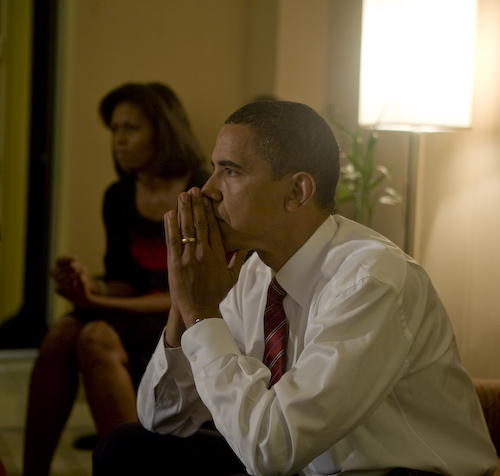
I didn't know that the Obama folks was using Flickr to upload pictures from across their campaign. They've also got shots, like this one, from Obama's hotel room on election night. This picture is taken as he watches McCain's concession speech. See all the pictures here (hat tip: Carly Kneppers '05
Monday, November 10, 2008
The president's Cab
Discover Cab Calloway!
Friday, November 07, 2008
Chelsea Waliser '04 talk on the Obama Campaign
Geoff LeGrand '10: Reflections on a summer in DC
For many students in the Politics and Government department, an internship in a congressman's D.C. office seems the ideal summer internship. This past summer, I had the honor of interning for Congressman Adam Smith (D-WA) in his Washington, D.C. office. However, having gone through this experience, I would like to take an opportunity to analyze the elements that, in reflection, I feel other students should consider before accepting their own internships.
One of the biggest challenges of hunting for internships often seems to be uncovering exactly what they entail. Often, internship duties are discussed in vague language. When considering a Capitol internship, these duties vary widely by office. However, they generally consist of data input – taking constituents concerns or comments via email, phone, fax, or mail and putting them into a computer database. This is generally the central duty of most Capitol interns. Other than that, the second most common duty is usually giving tours of the Capitol complex to constituents. Otherwise, interns essentially act as receptionists – taking care of whatever menial office duties are required.
With that said, I feel there are a number of misconceptions surrounding life as a Capitol intern. First, it must be emphasized that being a Capitol intern has little, if anything, to do with that which we learn here as students. Rarely does knowing the difference between open and closed list proportional representation electoral systems prove useful in one's life as an intern. Rather, being a Capitol intern is more similar to being a politician than a student of politics. The skills required are generally not taught in schools – the ability to write effective memos or carry a political motif. Most troublesome may be the ability to write without expressing the slightest bias on a given issue – the antithesis of what most Politics and Government students are taught to do. Most students will have to learn some or all of the requisite skills on the job. This transition from the ivory tower can be a stressful experience as many academic norms are ill suited to the Capitol environment.
The other common misconception is that being a Capitol intern is somehow a glamorous job. It is not. Interns are a dime-a-dozen in the Capitol. This is not to say that interns are disrespected – in fact there are strong norms against disrespecting interns. However, it is almost important to accept a Capitol internship with a clear sense of modesty. In academic life, future Capitol interns receive a lot of respect for having received a widely sought and prestigious internship. In D.C., however, interns unsurprisingly sit towards the bottom of the Capitol hierarchy. Their day-to-day role in the office will reflect this.
With that said, there are certainly numerous wonderful aspects of D.C. internship. The opportunities for networking are unlimited and many Capitol interns use their experience as a launching pad for their later careers. Furthermore, the educational experiences are also wonderful – both on and off the hill there are frequent intern-oriented lectures or briefings hosted by D.C. elites in their respective fields. Finally, the social aspects of a D.C. internship are wildly fun. Because so many interns from so many different places descend on D.C. during the summer – there is lots of friendship to be made, and lots of social events offered to interns. These range from a massive network of intramurals sports leagues (kick-ball, bocce ball and flip-cup leagues were some of many when I was in the city) to citywide scavenger hunts to other more traditional events.
The purpose of this reflection is certainly not to discourage anyone from accepting a Capitol internship. As I have said, it looks wonderful on a résumé, and can offer a wide variety of amazing experiences. In many cases you may never know where you want to take your career until you try out a variety of different options. Even if you do not like your Capitol internship, you will probably still walk away with a better idea of what you want to do in the future, and having had a lot of fun along the way.
With that said though, it's important to remember that Capitol internships are not the only game in town. There is a whole assortment of different internships available to Politics and Government students and many of these are of equal or higher caliber to a Capitol internship. A Capitol internship is not necessarily for everyone. If you are not oriented towards working in domestic politics or are looking for a laid back summer internship – this may not be the right experience for you. Choosing a Capitol internship because it seems the most glamorous is unwise. Rather, I would suggest one take the 'glamour' factor out of the equation and assess internships based on their own career desires and how they wish to spend their summers. This may still lead you back to the Capitol, but at least you will be there for the right reasons.
Thursday, November 06, 2008
We are up and coming
http://colleges.usnews.rankingsandreviews.com/college/libarts-uc-rank
This is clearly due to our department.
Wednesday, November 05, 2008
International reaction to the election
http://news.bbc.co.uk/2/hi/in_depth/7710631.stm
How poltiical scientists view the election results
The country just elected its first African-American president, a historic event capping a nearly two-year campaign of shattered fund-raising records, massive voter turnout and unprecedented participation in politics. Academics may be savoring the moment, but political scientists, at least, are more interested in how very ordinary it was...
As it turns out, some of the models political scientists have been using for years to predict the outcomes of national elections — taking into account factors like the popularity of the incumbent, party identification and economic indicators — weren’t tossed aside along with the many other fragments of conventional wisdom that were upended during the campaign. In fact, they were validated.
Read more here.
Tuesday, November 04, 2008
Maybe we're liberal, but students ignore us anyway.
An article of faith among conservative critics of American universities has been that liberal professors politically indoctrinate their students. This conviction not only fueled the culture wars but has also led state lawmakers to consider requiring colleges to submit reports to the government detailing their progress in ensuring “intellectual diversity,” prompted universities to establish faculty positions devoted to conservatism and spurred the creation of a network of volunteer watchdogs to monitor “political correctness” on campuses...
But a handful of new studies have found such worries to be overwrought. Three sets of researchers recently concluded that professors have virtually no impact on the political views and ideology of their students.
If there has been a conspiracy among liberal faculty members to influence students, “they’ve done a pretty bad job,” said A. Lee Fritschler, a professor of public policy at George Mason University and an author of the new book “Closed Minds? Politics and Ideology in American Universities” (Brookings Institution Press).
Read more here.
Monday, November 03, 2008
PAID internship--
Greetings;
The Washington Restaurant Association is looking for an intern for the legislative session. I posted the internship information on the school’s web site, but wanted to ensure your students were all aware of the open position.
I attached the general information about the position, and more information about the WRA can be found on our web site: www.wrahome.com.
The internship is paid, and we are able to work around any schedule students may have. We ask that any applicant have good-excellent writing skills, have a senior standing in school, and be available for full or part time work in Olympia during Jan. - March/April.
Thank you; feel free to contact me with any questions about the internship.
Julia Clark
Government Affairs Assistant
Washington Restaurant Association
www.wrahome.com
510 Plum St. SE, Ste. 200
Olympia, WA 98501
Work: 800.225.7166 x109
Cell: 360.628.7299
Fax: 360.357.9232
julia@wrahome.com
The Washington Restaurant Association, in its 79th year, is the leading business association for the restaurant industry — the largest private employer in the state with a workforce of more than 193,000 employees. In Washington, the more than 12,500 restaurants annually generate $10.7 billion to the state economy and contribute $593 million in state taxes. Washington restaurants are vital to our economy, community and careers.
Professors Sousa and Haltom predict the election
Election day scenarios
A note on the popular vote:
If Obama wins with over 50.1 percent of the national vote, he will be the third Democratic presidential candidate in 100 years to do so. FDR did it 4 times, with a maximum of 60.8% (1936) and a minimum of 53.4% (1944). Johnson ran at 61.1% in 1964. Carter got just 50.1%, and Wilson (twice), Truman, Kennedy, and Clinton (twice) were elected with less than 50% of the popular vote. Gore beat Bush in the popular vote but did not win 50% of the national popular vote.
It appears likely that Obama will win with 52 or 53 percent of the popular vote, which seems close but in historical perspective is a strong performance for a Democrat. This would be the second time a Democrat has done this well since before the end of WWII! Interestingly, many of the political scientists who predict election returns projected Obama wins with 52 or 53% months ago, raising once again the question of whether campaigns matter.
The electoral college:
These scenarios get a little confusing without a scorecard.
Most optimistic McCain map: McCain 281 Obama 257.
McCain has focused heavily on Pennsylvania as a matter of necessity. Because he has lost several Bush states—IA, NV, CO, NM—Pennsylvania is vital, but it’s not enough. Even if he wins Pennsylvania and Ohio (it’s hard to imagine him winning PA while losing OH) and holds the currently competitive Bush states like Indiana, Missouri, Florida, and North Carolina, Obama would still win the with the narrowest margin—270 electoral votes.
So, the most optimistic McCain scenario requires him to take Virginia in order to win.
This gets McCain to 281 electoral votes.
So in this scenario Obama wins all the Kerry states except PA, plus IA, NV, NM, and CO. McCain holds all of the Bush states but those listed above, and wins the election by cracking PA.
I think that this scenario is unlikely, but the most likely McCain victory map. I also think that Obama is going to outperform Kerry and Gore in lots of “red” states, and that under this scenario there’s a good chance that Obama wins a fairly solid popular vote victory while losing the electoral college.
I don’t think that there’s another feasible McCain victory map. Therefore, while watching the election returns on Tuesday the first focus should be on PA and VA, while keeping in mind that Obama wins in FL or NC mean that Obama will be elected in a fairly broad electoral college sweep. Sousa’s recommendation is that if you are at an election night party, eat dessert first, because the party could well end early!
Least optimistic Obama map. Obama 270, McCain 268. Under this scenario, Obama wins the election by carrying the Bush states listed above (IA, NM, NV, CO) and trading Kerry state PA for Bush state VA. It’s still hard for me to imagine a Democrat losing PA while carrying VA, so there’s a second version of this scenario in which Obama holds PA and loses VA: Obama 278, McCain 260. Given current polling, I think that it’s far more likely that Obama will carry both PA and VA and win with 291 electoral votes.
In fact, I think it’s highly unlikely that Obama will lose Pennsylvania. Thus, my recommendation that you eat dessert first at your election party holds.
All of the other feasible electoral college maps show Obama wins. The only questions are whether he will carry southern states—GA, NC, or FL—and crack OH and, more significantly, Indiana and Missouri. If a black Democrat from Illinois runs strong
Sousa’s presidential prediction? Obama 311, carrying Bush states Virginia, Ohio, NV, NM, CO, and IA and holding all of the Kerry states. Florida might get him to 338, but with polls so close there and the demographics of that state I see McCain as slightly advantaged here. I don’t think that Obama’s strength in NC, GA, IL, and MO and other “red states” like Montana are mirages. In fact, I think that given the trends in those states and the likely bloodletting in the Republican party after this (likely) McCain defeat, a reasonably successful Obama first term would redraw the electoral map of American politics substantially, solidifying Obama’s strategy of “expanding” Democratic efforts to formerly red states. Looking ahead, Obama’s got to hope that the economy turns around by 2010-2011 and that he gets the kind of lift that Reagan did from the recovery after the depths of the 1982 recession.
And from Professor Haltom:
David's report is measured and cogent.
I utterly agree that VA is crucial. For at least 22 days, VA has leaned
Obama's way. His lead in VA is > 5%. Most important, most recent polls
show Obama above 50% -- even if all undecideds go to McCain-Palin, Obama
squeaks through [ignoring the margin of error due to outlandish
hypothetical].
VA is scheduled to close its polls at 7:00 p.m. EST, so it MAY be a
temporally leading indicator. [If polling places are overwhelmed,
however, polls may close at 7:00 p.m. but everyone "in" the polling area
may be allowed to vote -- I am unsure.] If exit polls indicate an Obama
victory in VA, that deprives McCain-Palin of 13 electoral votes and puts
them, even with the most pro-GOP assumptions, under 270. Before PA
closes [supposedly at 8:00 p.m. EST], VA may render PA's electoral votes
moot. Then all that McCain-Palin would have would be some Diebold
miracle.
Indiana and Kentucky are scheduled to close their polls at 6:00 p.m.
EST. If Indiana actually goes Obama -- as David notes, not impossible
but not likely -- that may be the earliest signal that the Obama ground
game was what it was cracked up to be. Election-watchers should then
steel themselves for other Obama "takeaways."
P&G should probably counsel election-watchers to monitor the Dole-Hagan
Senate race when NC polls close at 8:30 p.m. EST [presumably]. That MAY
keep guests from desserting and deserting.
Friday, October 31, 2008
Students predict the Electoral College outcome
I teach a political participation course, and when the course overlaps with a presidential election, I have the students form into small groups, where they analyze all the available data out there, and make a prediction. All the groups have Obama winning the election (see plot below). On the low end, Group 4 has Obama winning only 291 electoral votes, and on the high end, Group 7 has Obama winning 353 votes. Most of the groups have Obama winning in the low 300s and McCain in the low 200s. I guess we’ll see on election night which group is the closest to the actual outcome (there’s some extra credit points riding on this).
Read more here.
Linz' Egypt Pics
Thursday, October 30, 2008
Professor Sousa: 11/20 talk in Portland
He will be offering commentary on the 2008 election with the title, "Full of Sound and Fury, Signifying...What? Lessons from the 2008 Presidential Election." Sure to be interesting; hope you can make it.
Wednesday, October 29, 2008
Inside Egypt: Crime and Punishment
I waited for my translator to arrive and we proceeded with our case. The accused changed his story over night, reneging his past statements and denying the incident altogether. It was finally time to make a decision; this is the part that stuns me. My translator and detective asked me what I wanted to do, if I wanted to proceed with the case, or if I would drop the case. I was astonished. This man broke the law, and everyone in the room is asking me if I want to continue with legal proceedings, or if I would chose to let the man free!
Then they proceeded in telling me that he had learned his lesson, that he had been tortured the previous night, and that the sentence would be a minimum of 10years in prison. I broke down crying. I am a compassionate person, I do not approve of torture, and I support the rule-of-law; this situation was one of the most difficult, and uncomfortable of my entire life. And then I had to make a decision.
Read more here.
Tuesday, October 28, 2008
Caitlin McGrane '10: Washington Semester at AU
The Washington Semester Program is part of American University in Washington D.C. The program consists of three parts: a seminar, internship and optional research project or elective class. There are many different programs, some related to US politics and law and others focus on international issues, journalism and business. Some programs are in DC the entire semester and others take three weeks to travel abroad.
The program I am in is Public Law; a program with no travel component. Three days a week I go to my seminar class which can manifest itself in a variety of forms. My class of 23 students from universities in the United States and abroad will either meet with political figures and experts in their place of business or on our campus as well as have more typical class lectures with only our professor. The caliber of speaker I have had so far has far exceeded my expectations. I have been able to listen to and ask questions of 11 members of congress, including the famous civil rights leader John Lewis and the currently controversial chairman of the Financial Services Committee Barney Frank. Other interesting speakers include CBS News reporter Bob Schieffer (who a week before speaking to my class moderated the third presidential debate), famous Watergate journalist Bob Woodward, Deputy Solicitor General Malcolm Stewart, Chief Judge Rufus King of the DC District Court, and Edwin Meese (the Attorney General under President Regan). In addition to these wonderful meetings I have had the opportunity to sit and listen to an entire Supreme Court oral argument, as well as conduct a mock markup of a bill in the actual House Armed Services Committee hearing room.
The other two days of the week are dedicated to an internship. The choice of internship is entirely up to the student. For my internship I chose to work for my representative, Cathy McMorris Rodgers. Working on the hill has been such a rewarding experience. I was in the gallery of the House when they passed the financial bailout and got to watch Speaker Pelosi make her statement before the vote was called. It was an unforgettable experience.
The Washington Semester program has been wonderful. I have had the opportunity to do so many memorable things. Not to mention the city is amazing. As someone who wanted to get away from Tacoma, but not necessarily to another country, this program was perfect. I STRONGLY recommend it. Please e-mail me at cmcgrane@ups.edu if you have any questions!
More information can be found at http://www.washingtonsemester.com/
Monday, October 27, 2008
Jeremy Briggs Roberts '99 Conducts
October 22, 2008
For Immediate Release
Jeremy Briggs Roberts to Guest Conduct
Washington Idaho Symphony
Leavenworth, WA-Jeremy Briggs Roberts, Artist in Residence at Icicle Creek Music
Center and Music Director and Conductor of the Icicle Creek Youth Symphony and
Summer Symphony, will lead the Washington Idaho Symphony as guest conductor in a pair of subscription concerts on November 1st at the Domey Gladish Auditorium in
Pullman, Washington, at 8:00 PM, and on November 2nd at Lewiston High School in
Lewiston, Idaho, at 3:00 PM. The exciting program of popular classics will include
Maurice Ravel's beautifully sensual Mother Goose Suite, a suite from Igor Stravinsky's groundbreaking ballet, The Firebird, and Ludwig van Beethoven's monumental and timeless Symphony No. 5 in C Minor, Op. 67.
Dr. Briggs Roberts, prizewinner at the 2006 Vendôme Academy of Orchestral Conducting
in Paris and recent competitor in the Ninth Cadaqués International Conducting Competition in Barcelona, Spain, has conducted such ensembles as the Ensemble Orchestral de Paris, St. Petersburg Festival Orchestra, Parnü Linnaorkester (Estonia), Moscow Symphony Orchestra, London Soloists Chamber Orchestra, Thüringen Philharmonie, among others. Previously Associate Conductor of the Philharmonisches Kammerorchester Berlin and Music Director of the University of Washington Contemporary Ensemble, Baroque Ensemble, and Opera, his stage credits include productions of Britten's Turn of the Screw, Cimarosa's Il Matrimonio Segreto, Mozart's Cosi fan Tutte, Die Zauberflöte, Der Schauspieldirektor, and Le Nozze de Figaro, Offenbach's Orphée aux Enfers, Poulenc's Dialogues des Carmélites, Ravel's L'enfant et les Sortilèges,Salieri's Prima la Musica e Poi le Parole, and Smetana's Bartered Bride. His principal teachers include Peter Erös, Janos Fürst, Jorma Panula, Gennady Rozhdestvensky, Gianluigi Gelmetti, and John Nelson.
The Washington Idaho Symphony, providing professional orchestral concerts to the
Palouse area of Washington State and to the nearby Lewiston, Idaho and Clarkston,
Washington areas, was founded in 1972, received non-profit status in 1974, and has
grown into a regional cultural asset. The Symphony's more than 70 instrumentalists
are primarily resident music faculty, professional free-lance musicians, and graduate
students of Washington State University (Pullman, WA) and the University of Idaho
(Moscow, ID).
For ticket information, please call the Washington Idaho Symphony at (509) 332-3408,
or visit them online at www.washingtonidahosymphony.org
Friday, October 24, 2008
Wednesday, October 22, 2008
Blogging scholarship!
http://www.collegescholarships.org/our-scholarships/blogging.htm
Is Your Blog Worthy of a $10,000 Scholarship?
Do you maintain a weblog and attend college? Would you like $10,000 to help pay for books, tuition, or other living costs? If so, read on.
We're giving away $10,000 this year to a college student who blogs. The Blogging Scholarship is awarded annually.
Scholarship Requirements:
* Your blog must contain unique and interesting information about you and/or things you are passionate about. No spam bloggers please!!!
* U.S. citizen or permanent resident;
* Currently attending full-time in post-secondary education in the United States; and
* If you win, you must be willing to allow us to list your name and blog on this page. We want to be able to say we knew you before you became a well educated, rich, and famous blogging legend.
Important Dates:
* Accepting Submissions: October 15th, 2008
* Submission Deadline: October 30th, 2008
The Starbucks theory of financial ruin
Remember Thomas Friedman's McDonald's theory of international relations? The thinking was that if two countries had evolved into prosperous, mass-consumer societies, with middle classes able to afford Big Macs, they would generally find peaceful means of adjudicating disputes. They'd sit down over a Happy Meal to resolve issues rather than use mortars. The recent unpleasantries between Israel and Lebanon, which both have McDonald's operations (here and here, respectively) put paid to that reasoning. But the Golden Arches theory of realpolitik was good while it lasted.
In the same spirit, I propose the Starbucks theory of international economics. The higher the concentration of expensive, nautically themed, faux-Italian-branded Frappuccino joints in a country's financial capital, the more likely the country is to have suffered catastrophic financial losses...
Read more here.



